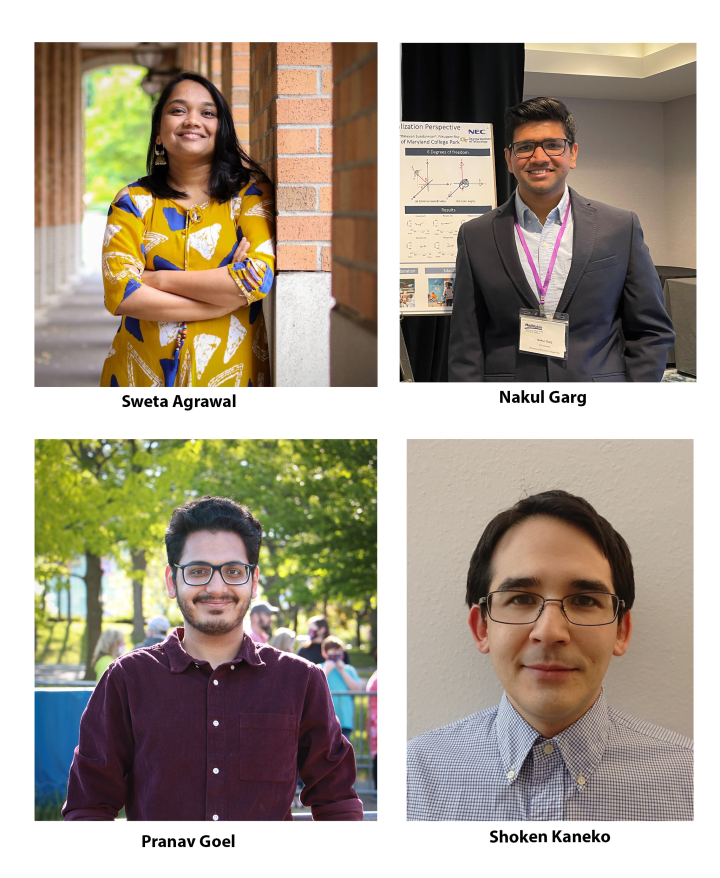Four CS Graduate Students Receive Ann G. Wylie Dissertation Fellowship
Four graduate students in the Department of Computer Science have been named recipients of the prestigious Ann G. Wylie Dissertation Fellowship for the academic year 2023-2024.
Sweta Agrawal, Nakul Garg, Pranav Goel, and Shoken Kaneko were each awarded the fellowship, with Agrawal and Goel being fifth-year students and Garg and Kaneko in their fourth year.
The Ann G. Wylie Dissertation Fellowship is named after Ann Wylie, a professor emerita in the Department of Geology at the University of Maryland. The fellowship provides doctoral candidates who are in the latter stages of writing their dissertations with a $15,000 stipend and other benefits.
These fellowships are highly competitive and are a testament to the exceptional research achievements of Agrawal, Garg, Goel, and Kaneko. Their work has been recognized by this prestigious fellowship, which will provide them with crucial support as they complete their dissertations.
Sweta Agrawal
A B.Tech from IIT, Guwahati, India, Agrawal's research focuses on developing adaptable, controllable, and efficient natural language generation models. Her work targets building context-aware multilingual text-generation systems that can help facilitate seamless communication between humans and machines.
“What stands out about Sweta is that she simultaneously has the deep technical expertise and the desire and ability to incorporate findings and methods from other disciplines to inform her technical work,” says her advisor, Professor Marine Carpuat.
Agrawal has an excellent track record of research productivity with 8 publications at top-tier conferences. In addition to this, she has contributed to Technica 2022 the world’s largest hackathon for underrepresented genders in Computer Science.
After completing her Ph.D., Sweta plans to pursue a career in academia.
Nakul Garg
At iCoSMoS Lab, Garg collaborates with his advisor, Professor Nirupam Roy, on developing innovative and practical low-power intelligent sensors. These sensors operate on battery-free platforms and use minimal energy harvested from the environment. The goal of his research work is to address resource-constrained applications such as ambient computing, micro-robot navigation, wildlife tracking, and precision agriculture.
Garg is a highly skilled researcher in mobile computing, embedded AI, signal processing, wireless communication, and networking. His work has been widely recognized, resulting in several publications in top-tier conferences and awards for best paper and best demonstration.
“Nakul has always been a shining star in his academic endeavors. His doctoral research has created new opportunities for the future of ambient computing by combining ideas of embedded learning, ultra-low-power sensing, and communication. It is his extraordinary curiosity and perseverance that lead to his success,” says Professor Roy.
Garg aspires to become a faculty member after completing his Ph.D. He is among the few students selected for the UMD Future Faculty Program, 2023 organized by the Clark School.
Pranav Goel
Working with Professor Philip Resnik, Goel is developing new computational methods to analyze communicative choices and investigating substantive research questions in computational social science, including large scale analyses of behavior and text in the U.S. Congress, news media, and on social media platforms. His ultimate goal is to gain insight into the social dynamics of the world, and particularly to improve our understanding of sociopolitical phenomena.
Before joining UMD, Goel earned his B.Tech from IIT (BHU), Varanasi, India.
“I’ve advised quite a few excellent students who have done high-quality work and gone on to very successful research careers in academia and industry, but in 26 years at the University of Maryland, I don’t think I’ve ever had an advisee like Pranav who, at this point in their graduate career, had already succeeded in doing so much research with such strong potential for visible and widespread social impact,” says Professor Resnik.
After completing his Ph.D., Goel intends to pursue a postdoctoral position to further his research before eventually joining academia.
Shoken Kaneko
Kaneko works on the development of new numerical methods for fast and accurate simulation of acoustics and other physical phenomena concerning wave propagation and potentials. His research domain ranges from computer science to applied mathematics, physics, and engineering.
Before joining UMD he completed his Master's in Physics from Radboud University Nijmegen, Netherlands.
“Shoken is passionate about his work – he is driven to understand and create the highest quality immersive spatial audio using all tools at his disposal: machine learning, numerical simulations,and computational physics,” says his advisor Professor Ramani Duraiswami.
After completing his Ph.D., Kaneko is open to exploring various career paths, including opportunities in the industry, starting his own company, or pursuing a career in academia.
The Department welcomes comments, suggestions and corrections. Send email to editor [-at-] cs [dot] umd [dot] edu.
